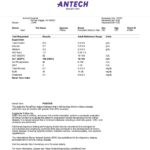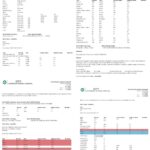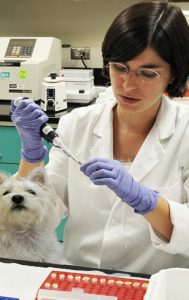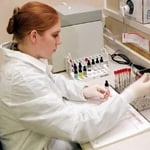Ron Hines DVM PhD
 See What Normal Blood & Urine Values Are
See What Normal Blood & Urine Values Are
 Causes Of Most Abnormal Blood & Urine Tests
Causes Of Most Abnormal Blood & Urine Tests
Your Pet’s Blood Chemistry Panel = A Comprehensive Metabolic Panel
I spend much of my day pouring over the blood chemistry values sent to me by pet owners. With that information and the pet’s medical and social history, I try to find patterns suggestive of one disease or another. The ability of veterinarians to obtain these blood values gives us tremendous insight into the processes occurring in your dog or cat’s body. But none of these tests are infallible. They sometimes fail to spot problems, spot problems that are not really there, or give inconclusive results. For those reasons, blood chemistry values mean much less without knowledge of your pet’s complete medical history and, whenever possible, an in-person health examination by your local veterinarian that allows ancillary testing (such as body imaging), and a close physical examination. There was a time when physical examination of your pet was all that veterinarians could offer you. That time has long pasted. This website is meant to offer you insights into how I make diagnoses and choose treatment options. Nothing more. Blood chemistry panels give your veterinarian the best overall picture of your pet’s metabolic state – an insight into all the physical and chemical processes that are occurring it its body at the time. Certain tests focus on certain organs. You can read about the focus of tests here. Veterinarians in most of the World have two options in obtaining blood chemistry values for your cat or dog. They can run them “in house” on blood chemistry analyzers, or they can send the blood samples out to a national veterinary diagnostic laboratory. Other than in emergencies, I personally prefer that my client’s pet blood samples be sent to a national diagnostic laboratory. The reason I prefer to send blood samples to national labs is because I do not feel confident that I can maintain these complex machines adequately in a typical veterinary hospital environment. There are other veterinarians who share my concerns. Inaccurate in-clinic analyzer machines can lead to inaccurate diagnoses. The AVMA has no independent quality control mechanism and veterinarians must rely on the claims of their sales force that an occasional calibration is sufficient to insure test quality. I also appreciate the expert feedback and interpretation of difficult reports that I have available from the competent clinical pathologists these laboratories keep on staff. In-office analyzers at your local veterinary hospital are extremely important when your pet is critically ill, in need of immediate care and in emergencies when your veterinarian and pet just don’t have the time to wait to get blood results back from an off-site testing services.
In-office analyzers at your local veterinary hospital are extremely important when your pet is critically ill, in need of immediate care and in emergencies when your veterinarian and pet just don’t have the time to wait to get blood results back from an off-site testing services.
The two largest veterinary testing laboratories in the USA are 

DxMe
You are on the Vetspace animal health website Visiting the products that you see displayed on this website help pay the cost of keeping these articles on the Internet.

